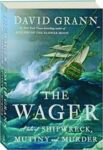
by David Grann, 2023
Good, fast read by the author of Killers of the Flower Moon. Tells the true story of the ship, the Wager, a British warship that took off in 1740 for an ill-fated voyage with 4 other ships, to go around Cape Horn (the tip of South America) and capture a Spanish treasure ship on the west coast of South America during the War of Jenkins’ Ear.
They were doomed from the start. They couldn’t get enough men to man the ships so they used “press gangs” to kidnap sailors off the streets. Their ships were taking too long to build and repair. Finally, they set sail and shortly after, a Typhus outbreak hits the men. They drop like flies. They didn’t know what caused it. Then, a few months later, scurvy hits. Then the storms they face rounding South America were horrendous. Two of the ships disappear. The Wager makes it around only to be shipwrecked on an island on the southwestern coast of South America. They try to make a go of it on this island but they are starving, freezing, sick. The only good time is when some natives in canoes come to help them, show them how to build teepees, how to find food (seaweed, seals, birds, wild celery). But the natives soon disappear when the men get ideas concerning their women. The captain, Cheap, is arrogant and would listen to no one. He kills a young sailor. The gunner, Bulkeley, and most of the men try to get him to listen to reason. They have built a small ship and want to return to England via the Straits of Magellan. But Cheap wants to continue north, try and find Anson (the commander of the expedition on the ship, Centurion). That would be madness in the small ship, into enemy territory.
Finally, Bulkeley and most of the men leave on the ship, leaving the Captain and a very few loyal men behind. Miraculously, in stages, many of the men on these ill-fated ships make it back to England. They tell their stories. A court-martial is demanded by Cheap. The court-martial ends up being a tiny slap on the hand to one man and that’s it. Everyone else is free and clear – Cheap is not accused of murder and Bulkeley and his men are not accused of mutiny. The powers that be just want the whole thing to disappear. The War of Jenkins’ Ear was a mistake to begin with and England has moved on.
It’s amazing how anyone could live through what these men lived through–diseases, storms, extreme weather and hardships.
I learned two main things: The term knots, as used to describe the speed of a sailing vessel, comes from this: Byron, a young midshipman, learned “how to measure the ship’s speed by casting a line ribbed with evenly spaced knots into the water and then counting the number that slipped through his hands over a period of time. (One knot equaled a little more than a land mile per hour.)”
And secondly, the cure for scurvy was citrus fruit, which is discovered decades later. “The cure–that unforbidden fruit which decades later would be furnished to all British seamen, giving them the nickname Limeys–had been right within their grasp.” So, that is why sailors are called Limeys.